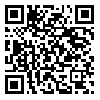Mohaghegh Ardabili University , arezoomojarrad@yahoo.com
Abstract: (4158 Views)
Introduction: Test anxiety is now one of the most common types of anxiety. The purpose of the present study was to examine the effect of cognitive‐behavioral and existential methods on reducing test anxiety in nursing students.
Methods: This quasi-experimental study employed a pretest-posttest design with control group. Statistical population consisted of all nursing students of Ardabil University of Medical Sciences in 2016. Sarason’s test anxiety questionnaire (pretest) was first administered to 500 nursing students. Of those found to have test anxiety, 45 students were selected by random sampling and randomly assigned to three groups (two experimental groups and one control group). The first group received cognitive‐behavioral therapy and the second group received existential psychotherapy for six 50-minute sessions. The control group received no intervention. Sarason’s test anxiety questionnaire was administered once again (posttest) to all of the participants, and the collected data were analyzed by means of descriptive statistical tests and ANCOVA.
Results: The mean and standard deviation of anxiety scores were 16.20±2.30 (pretest) and 13.33±10.3 (posttest) in the cognitive-behavioral therapy group, 17.06±2.63 (pretest) and 14.73±34.3 (posttest) in the existential psychotherapy group, and 16.68+54.7 (pretest) and 17.33±41.3 (posttest) in the control group. Analysis of covariance showed that the posttest anxiety mean scores (F=10.17, p=0.001) were significantly different in the three groups.
Conclusion: Results of the study suggest that proper planning and timely implementation of cognitive-behavioral and existential therapies can prevent the consequences of anxiety in students.
Methods: This quasi-experimental study employed a pretest-posttest design with control group. Statistical population consisted of all nursing students of Ardabil University of Medical Sciences in 2016. Sarason’s test anxiety questionnaire (pretest) was first administered to 500 nursing students. Of those found to have test anxiety, 45 students were selected by random sampling and randomly assigned to three groups (two experimental groups and one control group). The first group received cognitive‐behavioral therapy and the second group received existential psychotherapy for six 50-minute sessions. The control group received no intervention. Sarason’s test anxiety questionnaire was administered once again (posttest) to all of the participants, and the collected data were analyzed by means of descriptive statistical tests and ANCOVA.
Results: The mean and standard deviation of anxiety scores were 16.20±2.30 (pretest) and 13.33±10.3 (posttest) in the cognitive-behavioral therapy group, 17.06±2.63 (pretest) and 14.73±34.3 (posttest) in the existential psychotherapy group, and 16.68+54.7 (pretest) and 17.33±41.3 (posttest) in the control group. Analysis of covariance showed that the posttest anxiety mean scores (F=10.17, p=0.001) were significantly different in the three groups.
Conclusion: Results of the study suggest that proper planning and timely implementation of cognitive-behavioral and existential therapies can prevent the consequences of anxiety in students.
Type of Study: Original research article |
Subject:
Clinical Teaching
Received: 2017/05/22 | Accepted: 2018/03/13 | Published: 2018/04/15 | ePublished: 2018/04/15
Received: 2017/05/22 | Accepted: 2018/03/13 | Published: 2018/04/15 | ePublished: 2018/04/15
| Rights and permissions | |
 |
This work is licensed under a Creative Commons Attribution-NonCommercial 4.0 International License. |



